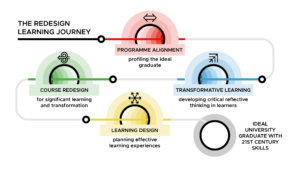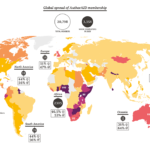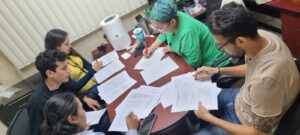
Transforming Higher Education for Social Change – a model from East Africa to support significant learning and transformation
Working with partners in Tanzania, Uganda and Kenya, we are pleased to share a new scalable pedagogical model to support lecturers and institutions in low resource settings to transform their teaching and learning practices.
Many graduates can be ill-prepared to address the challenges they encounter in the workplace or to leverage their skills and ideas to meet social needs. Key reasons for this are a lack of focus on critical thinking and problem solving within university teaching and learning, insufficient connections between employers and communities, and learning environments that don’t enable women and men to learn equally. In 2018 a new partnership called Transforming Employability for Social Change in East Africa (TESCEA) set out to address this challenge by supporting universities, industries, communities, and governments to work together to create an improved learning experience for students – both women and men.
A scalable pedagogical model for higher education in low resource settings

Working with partners in Tanzania, Uganda and Kenya, TESCEA has developed a new scalable pedagogical model to support lecturers and institutions in low resource settings to transform their teaching and learning practices. The model supports universities to create learning environments that encourage critical thinking and to connect with businesses, communities and governments in order to strengthen the relationship with their external stakeholders. This is to ensure that students graduate with the skills and competencies needed in the world of work:
- Our toolkits and online courses present a rigorous methodology of pedagogy and curriculum redesign that supports lecturers themselves to rethink their teaching and become facilitators of student-centred learning – helping students learn how to think, not what to think. The toolkits provide resources for both facilitators and participants, including day-by-day guidance for running sessions and supporting materials to use in preparation for and during the workshops. The online courses enable academics to learn at their own space and to fit it around other duties.
- Our case studies document how the TESCEA team and partner institutions (Mzumbe University and the University of Dodoma in Tanzania and Gulu University and Uganda Martyrs University in Uganda) have put the model’s approaches into practice. The case studies also provide advice for other institutions seeking to implement the approaches.
- Our publications, including reports, papers, and blog posts, share learning and detail the impact of our model.
What the model helps lecturers and institutions to do
Our model has been developed, tried and tested by East African lecturers and institutions to support others through their own change process. It has been specifically built to:
- Support teaching for critical thinking and problem-solving: This isn’t about teaching a specific set of skills, or body of knowledge, but about equipping students to be able to think for themselves, to appraise and assess information and evidence, and to use it to formulate arguments, and to solve problems.
- Integrate gender-responsiveness into the process of course (re)design, teaching and learning, class management and assessment: This prevents pedagogical practices from reinforcing gender inequalities in the classroom, which restrict learning outcomes for women, and perpetuate gender stereotypes.
- Respond to the needs of local communities: Supporting lecturers and universities to connect with and involve business, industry, public sector and community from the very beginning enables them to understand what kind of graduates are needed in the world, and how their programmes can meet that need.
- Support rapid change: Many initiatives to improve teaching and learning have sought to re-design a whole degree programme. This is valuable, but also takes time. Instead, our model supports a course-level approach to transformation, enabling lecturers to design, test and refine courses iteratively and respond more rapidly.
The impact of our approaches
The model is proven to support rapid transformation of the higher education learning experience. Our project evaluation showed that “TESCEA has developed the capacity of its teachers to teach for critical thinking and problem-solving in a gender responsive manner.” This is evident by “an increase in the frequency of critical thinking, problem-solving and gender-responsive learning activity engaged in by students as well as collaborative activity between students and teachers.”
“After reading the pedagogy of the oppressed and going through TESCEA training, I felt strongly that all along I had been denying my students the right to learn. Therefore, I would […] learn more on transformative teaching and learning in order to help students unlock their potentials to become critical thinkers and problem solvers in order to facilitate change in the communities they serve and the nation at large.”
(Lecturer, Mzumbe University)
Moreover, the evaluation found that the TESCEA approach to connecting universities more closely with business, industry, public sector, and community has “enriched the collaboration between industry and academia, enriched the students and teachers’ learning and teaching experiences respectively; and […] enabled greater access to more graduate placement/internship opportunities.”
As a partnership, we have always seen our success as not only being about what we were able to achieve in the four TESCEA partner universities, but also in our ability to design a scalable model that can be replicated in other institutions. We are very excited to now be able to share our model and resources, which are readily available and accessible via our dedicated website: www.transformHE.org.
The TESCEA partnership continues to seek opportunities to use the model to support transformation in other universities, regions and countries. If you are keen to transform teaching and learning in your institution then get in touch – we’d love to talk, and to see how our model could help you to make the changes you want to make. Contact us via TransformHE@inasp.info.
***
Transforming Employability for Social Change in East Africa (TESCEA) is helping young people in Tanzania and Uganda to use their skills and ideas to tackle social and economic problems. With partners in Tanzania, Uganda and Kenya, TESCEA supports universities, industries, communities and government to work together to create an improved learning experience for students – both women and men. This improved learning experience fosters the development of critical thinking and problem-solving skills, and allows for practical learning beyond the classroom that improves a graduate’s employability.
The TESCEA partnership is led by INASP (UK), working with Mzumbe University (Tanzania), University of Dodoma (Tanzania), Gulu University (Uganda), Uganda Martyrs University (Uganda), Association for Faculty Enrichment in Learning and Teaching (Kenya), LIWA Programme Trust (Kenya) and Ashoka East Africa (Kenya).
TESCEA is funded by the UK’s Department for International Development (DFID) as part of DFID’s SPHEIR (Strategic Partnerships for Higher Education Innovation and Reform) programme to support higher education transformation in focus countries in Sub-Saharan Africa, Asia and the Middle East.
To learn more about INASP’s Gender Responsive Pedagogy in Higher Education Framework, click here.

 Previous Post
Previous Post Next Post
Next Post


